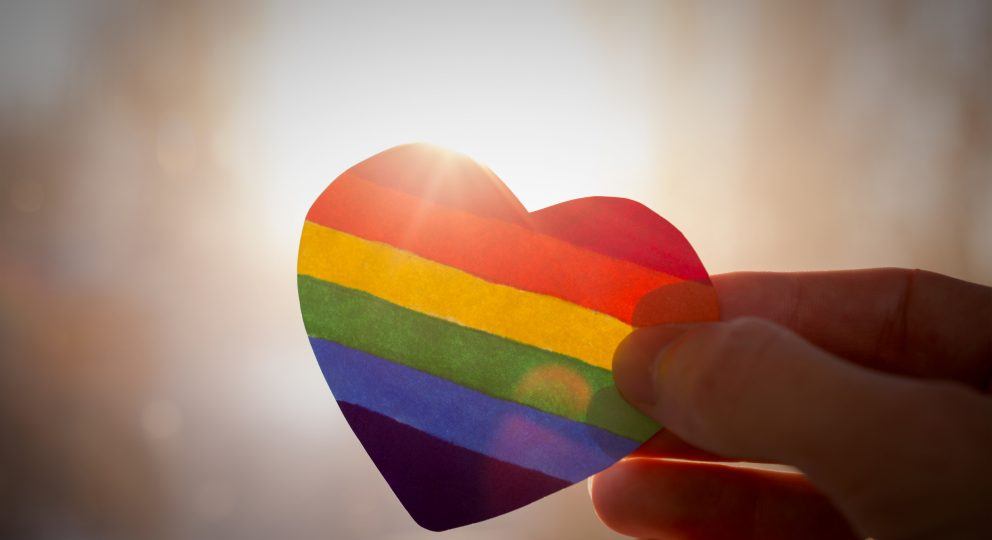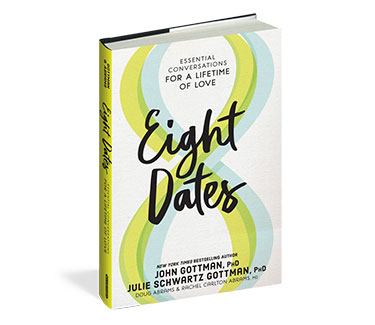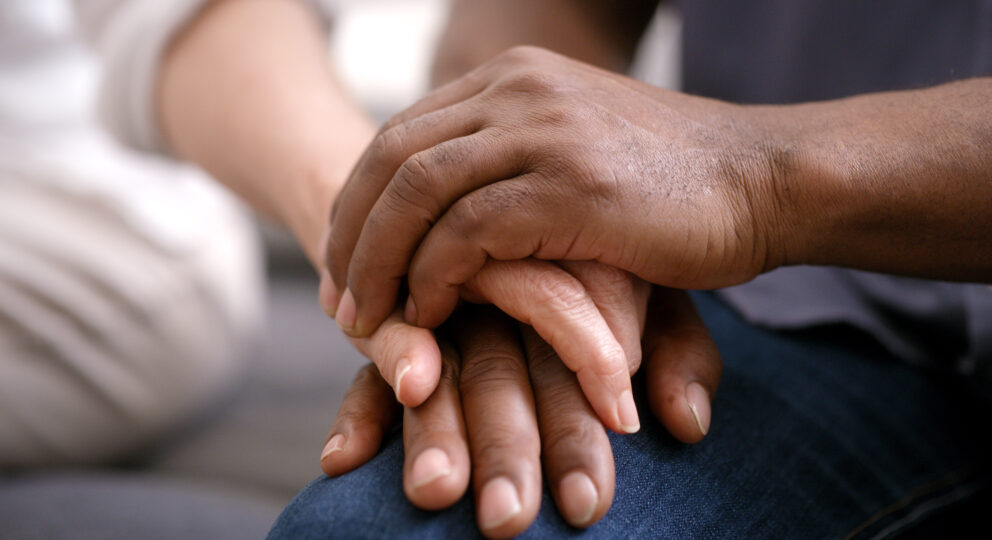Editor’s Note: We’ve been studying relationships for the last four decades, but we still have so much to learn. Through the stories and experiences shared in Real Relationships, we aim to paint a more realistic picture of love in the world today. The views, thoughts, and opinions expressed in this article belong solely to the author, and are not necessarily based on research conducted by The Gottman Institute.
Matt* and Isaac* met in 2008. When they got married in 2012, they were both still in the closet—Isaac as a transgender homosexual man and Matt as a cisgender homosexual man. We had the pleasure of learning more about their love story and their journey of coming out to themselves, and each other.
So, first thing’s first, tell me about your story!
Isaac: We met just after finishing college while working at a used bookstore outside Philadelphia. It was pretty clear early on that we were totally smitten; in fact, our co-workers and boss teased us about it mercilessly! I was dating someone at the time, so Matt and I didn’t get together right away. But once we did, man did we make up for lost time! We moved in together after dating for only four months. I’d say the first big hiccup in our relationship came when I decided to apply to law school. Matt gallantly agreed to move to Pittsburgh with me for school, which basically made me realize just how committed he was to our relationship. We were kind of miserable there—neither of us was out at this point, and we were deeply closeted even to ourselves.
We both grew up in times and places where being part of the LGBTQ+ community was something you didn’t shout about. In fact, I didn’t even know that it was possible to be transgender until I went to Bryn Mawr College and met a lot of other guys who were already transitioning. Even then, I stayed in the closet for more than a decade afterward, for, well, so many reasons. I wish I had come out sooner sometimes, but then Matt and I might never have met. Things sometimes happen when you are ready for them to happen. And the timing finally felt right to come out after we moved to Tacoma.
Matt: Totally! I think it helped to have that psychic distance. We both grew up in intensely homophobic pockets of West Virginia and Pennsylvania, so to live and work across the country gave us “permission” to come out to each other. Our friends and co-workers have been incredibly supportive here. Sometimes I give myself a hard time about coming out so late at 32, but as my best friend put it to me, “You did what you had to do to survive.” So it ended up being kind of a novel situation: a closeted trans guy and a closeted cis homosexual finding each other, supporting each other, and creating the kind of marriage where we could eventually be honest with each other about our authentic selves.
How do you navigate change together, as a couple? How do you determine what works or feels “right” to you?
Isaac: For the most part, it comes down to communicating often, honestly, and respectfully. We don’t “fight” very often because we agree that we’ll tell each other when there is a grievance, rather than letting small cuts turn into a gaping wound. That’s harder to come back from, those big blow-up fights. We’ve definitely had one or two in our marriage—doesn’t everyone? But ultimately, we try not to let our own self-interest override the interest of the marriage. That’s something invaluable we picked up from reading John and Julie Gottman’s book, The Science of Couples and Family Therapy. We try to do things that make each other happy because we understand that it builds goodwill in the marriage. That matters when those occasional bigger arguments come around because you’ve created a feeling of safety and security in the marriage by creating these small moments of connection and tenderness every day.
Matt: The most important thing for us, and for most couples it seems like, was to learn how to fight effectively. It’s something that we had to teach ourselves because the way marriages were modeled for both of us growing up was that conflict was to be avoided. The couples that don’t argue and communicate are the ones that don’t tend to last. We had a couple of foundation fights over the years and that helped to establish a base for us to be able to move forward. A big part of those conversations working as well as they did was that neither person took the full weight of the emotional baggage that was being unpacked. We’ve been actively conscious of that. Sometimes I like to imagine the marriage being a third person in our family that we are each responsible for maintaining and nurturing.
Help me understand what you mean by “foundation fights?”
Isaac: Foundation fights are the memorable ones we have had over the years. Generally speaking, they revolve around a central issue or theme in our relationship. They are the fights that helped us come to know each other better, that helped us clarify our values individually and as a couple.
How have you shaped one another’s understanding of identity?
Isaac: I’d say we have been pretty formative to each other’s experience of identity. We met fairly young, when we were both 22, so we went through a decade in the closet together. Personally, I never really thought of us as a “straight” couple before. I’d always felt queer but never knew how to understand that part of myself. It really helped solidify things, being in a relationship with Matt. I’ve always had, shall we say, “husbandly” instincts in our marriage, in more ways than one. By the time I came out, Matt was fairly unfazed. It was so relieving to have him validate my experience during that time, which was rocky, to say the least.
Matt: It’s been a challenge trying to explain it to our straight friends. I was so far in the closet that I kept trying in vain to make relationships with women work and it was both a relief and a little confusing to me that Isaac and I worked so well when we first got together. We met the year we both graduated from college and at that point I was gearing myself up to be alone and celibate. I was looking into joining a Buddhist monastery—
Wait, what?
Matt: Yeah! It’s not that uncommon among gays in the closet. If I had 50 more dollars during the summer of 2008, Isaac and I never would’ve met. Life is funny that way.
So when we met we presented as a straight cis couple. Those boxes and assumptions that people placed us in, because it’s the cultural norm and because it’s convenient, were pretty far away from how we actually were as a couple. Even still, we wasted a lot of time trying to force ourselves into those boxes and assumptions. The amount of emotional energy and freedom that we have now is a little staggering sometimes.
What resources, books, etc. have been helpful?
Matt: It was serendipitous that Isaac came out while he was studying to be a counselor. I think a big part of him realizing his true self came during his course in group therapy. Things also clicked while he was studying family therapy. Also, and my inner Luddite hates to admit this, I think the trans community on Instagram helped him come to terms with who he’s always been. For me personally, I read a wonderful book called The Velvet Rage by Dr. Alan Downs that helped me process the trauma that happens when you’re a gay man in a straight world. Not being able to communicate to people who you actually are creates a lot of anger and resentment. I ended up internalizing a lot of that. It’s something I’m working through in my individual therapy.
Isaac: Yeah, there’s an intense kind of self-inventory you do as you prepare to be a therapist. And in reading authors like the Gottmans, Irvin Yalom, Virginia Satir, Marsha Linehan. There are so many different paradigms and approaches to therapy, but underneath it all is an individual’s quest for a healthy self and healthy relationships. I finally found the language to describe the cognitive dissonance I’ve been experiencing (especially about dysphoria) for my entire life. It was freeing and also sad, because I realized how fully I have been limiting and policing myself up until now. As Matt mentions, Instagram and other online communities like Reddit were useful, too. I would also be totally remiss if I didn’t mention the invaluable support of all of my teachers and classmates in the graduate school co-hort. I also work at the university, and they have a very strong queer alliance on campus, which is amazing. It helped me see that transitioning doesn’t have to be something that is shameful. It can be such a joyful experience, which is not the narrative that gets told very often in our cis-heteronormative society.
What parts of previous identities or “labels” are you happy to let go of?
Isaac: For me, it’s been this huge sigh of relief to not have to pretend interest in stuff like makeup. I got really good at makeup, actually, as kind of a camouflage response to never feeling at home in women’s attire. (“If my eyeliner wings are on point, they’ll never suspect!”) My social life feels different, too, in a good way. It sounds so simple, but when you are showing people your genuine self, it invites them to do the same. I am so grateful for the people in my life, especially Matt.
Matt: I literally had to force myself to like soccer so I would have something to talk to straight guys about. Isaac is way more in tune with the more stereotypical side of masculinity and it’s been refreshing to see him be able to express that side of himself. There is a bit of whiplash, though, with how we interact with people now. I’m still learning how to let go of those inauthentic aspects of myself that I created just so I could fit in and not get harassed. I remember reading somewhere that “the skills you use to survive are not the same skills you use to thrive” and that stuck with me. So much of how I used to act and how I used to communicate with people was really just a mechanism so I wouldn’t be ostracized. Self-deprecation and not talking about my emotional needs were the two more intense aspects of that performance. That being said, I understand that not every gay guy goes through this, especially the ones who grew up in more stable environments. Isaac and I didn’t have the smoothest upbringings so there are deeper issues we’re still unpacking both in couples and individual counseling.
Looking back, what did you find most limiting about being in a “straight” relationship? What expectations did that create for each of you, as individuals and as a couple?
Isaac: I felt like I had to be the “mother” of the house or something, because that’s what society conditions female-bodied people to do. My grandmothers taught me from a young age how to clean, cook, and sew. Indirectly they taught me that it was okay to resent your husband, so long as the chores got done. I have always been a fairly up-front person with my feelings, but for some reason discussing the division of labor in our marriage has always been tricky. I think in the same way I hid behind makeup, I hid in the role of “wife.”
Matt: There was a similar tension for me because I have never brought in that much money to the marriage. We were, for many reasons I’m not proud to admit, kind of beholden to those ’50s stereotypes where the man makes the money and the woman manages the house. There’s been a lot of conscious unlearning that we’ve both been doing to let that stuff go. I’ve always been more of a caregiver than a provider in that sense—someone who wanted to communicate about emotions and about anxieties, someone who enjoys being a nurse. Helping Isaac recover from his first surgery felt deeply rewarding to me because it meant that I could take care of him. That’s not something that the culture encourages men to do. And I love cleaning the house and making sure he feels safe and content. That said, I’m still a horrible cook.
Isaac: You’re not so bad. At any rate, you’re amazing at ordering takeout, which is just as good!
What have been some of your greatest challenges as you navigate new identities as individuals, and also as a couple?
Matt: It’s not something I like to admit but I don’t know if I would’ve had the confidence to come out as gay if my spouse didn’t come out as trans. Seeing him be that honest, seeing him come out to his family and friends, how could I not be inspired by that? How could I stay in the closet? Somewhere down the line, I ended up internalizing this deep fear of rejection and having him with me has been a continual source of strength. We kind of parented each other, in that regard, because I think you need to be able to trust someone, really trust someone, to articulate this essential part of yourself that you were conditioned to believe was shameful.
Coming out was a bit of a catalyst. It finally let me confront a lot of unprocessed darkness from my past that I have been incredibly hesitant to address. Eventually, you have to look those demons in the face if you have any hope of having a life worth living, though. Every month gets easier. Despite the more frightening backsliding that’s happening with how the culture treats the LGBTQ+ community, we’re slowly getting more at home with ourselves and with each other. Obviously, those two things are pretty connected—how we each process our own issues definitely affects the relationship. That’s pretty universal though.
Isaac: So far the biggest challenge for me has been asking everyone I know to see me in this different light. I have been hugely fortunate to have a supportive family, work colleagues, and friends. However, misgendering still happens on rare occasions, and I am starting to learn how to cope better with that. The times it has happened have by no means been malicious, but it still registers as upsetting for me. Body dysphoria is also a constant battle. I had top surgery this past year, which did absolute wonders for my well-being. But dysphoria still rears its ugly head more often than I care to admit. Matt has been with me throughout all of this, and he is such a compassionate listener. Simply being present and listening is just about the best thing a spouse can do, in my opinion. He helps me feel seen, and there is a special quality to being near him. Matt makes people feel good about themselves because he always looks for the best in others.
What have been the greatest joys? Have you created any new rituals together?
Matt: The greatest joy is that we finally get to be honest with each other. It’s not an exaggeration to say that Isaac coming out saved both of our lives. There was always some essential truth that was missing, something that almost split us up, and to have that be articulated was this previously unnameable emotional splinter we were finally able to tweeze out. It’s like we restarted our relationship. There’s nothing better than getting to fall in love with your spouse all over again.
Isaac: I could not have said it better myself, Matt. It’s the greatest delight waking up with you every day and falling asleep together every night. We have a ritual on Saturday morning, where one of us (usually Matt) wakes up early and procures coffees and pastries from our favorite place, Bluebeard. After breakfast, we lounge around the couch reading the news, watching cartoons, talking. It’s this cozy few hours that always starts the weekend off on the right foot. Also, I have loved watching Matt start to embrace his more fey side. His hair is getting so long, and he is rocking a lot of flower print button-downs lately. Honestly, he’s never been more attractive! I’m smitten if you can’t tell.
*Some names and identifying details have been changed to protect the privacy of individuals.
Sign up for the Love Notes Newsletter
Get the latest on relationships, parenting, therapy and more from the experts at The Gottman Institute, plus get a FREE download every month!
.









